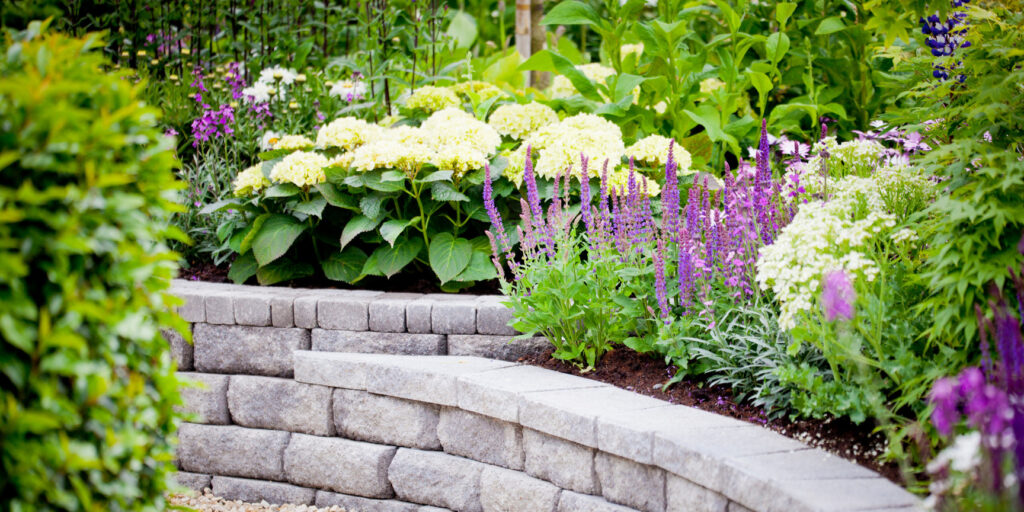Sustainable landscaping involves designing and maintaining outdoor spaces that prioritize environmental health, resource efficiency, and aesthetic appeal. For commercial properties, sustainability is essential as it enhances visual attractiveness, reduces maintenance costs, and promotes ecological balance. Benefits also include supporting biodiversity, lower water usage, and increased property value, making it a smart investment.
Native plants enhance aesthetics, support local wildlife, and reduce maintenance needs. Modern techniques, such as pollinator-friendly gardens, efficient irrigation systems, permeable paving, and year-round appeal further promote biodiversity and environmental conservation, ensuring long-term ecological health.
1. Native Plants: Adapting to Local Climate
Native plants are an excellent choice for sustainable landscaping, offering numerous benefits for commercial properties. These plants are naturally adapted to the local climate and soil conditions, requiring less water and maintenance compared to non-native species. This adaptation results in reduced irrigation needs and lower overall costs for commercial properties.
Examples of suitable native plants for East Tennessee include:
- Asters
- Black-Eyed Susan
- Coreopsis Red Buckeye
- Phlox
- Purple Coneflower
These plants have evolved alongside local pests and diseases, developing natural defenses that increase their resilience. As a result, they rarely require pesticides, further reducing maintenance costs and environmental impact. Native plants also support local ecosystems by providing food and habitat for native wildlife, including pollinators like butterflies and bees.
By incorporating native plants into commercial landscapes, property managers can create visually appealing, low-maintenance, and ecologically beneficial outdoor spaces. This approach not only enhances the property’s aesthetic value but also contributes to the overall health of the local environment.
2. Pollinator-Friendly Gardens: Supporting Local Ecosystems
Pollinator-friendly gardens are another sustainable landscaping choice for commercial properties, offering numerous benefits for ecosystem health and biodiversity. These gardens provide essential habitats for pollinators, which are crucial for plant reproduction and maintaining healthy ecosystems.
Key design elements of pollinator gardens include:
- A variety of native plants that bloom from early spring to late fall
- Plants grouped in clumps for easy pollinator access
- Reduced use of pesticides
- Water sources, such as damp salt licks
These gardens support local wildlife by providing food and shelter for various pollinators, including bees, butterflies, moths, and hummingbirds. Additionally, pollinator gardens help combat habitat loss, one of the biggest threats facing pollinators today.
By choosing pollinator-friendly landscaping, your commercial property can play a vital role in supporting local ecosystems and enhancing biodiversity in urban and suburban areas.
3. Efficient Irrigation Systems: Minimizing Water Waste
Efficient irrigation systems offer significant water conservation benefits and cost savings, making them a sustainable landscaping choice for commercial properties. These systems deliver water directly to plant roots, minimizing waste through evaporation and runoff.
They can accomplish this through a number of different designs, including:
- Drip irrigation
- Micro-sprays
- Smart sprinkler systems
Smart irrigation controllers and sensors play a crucial role in optimizing water use. These include weather-based controllers that adjust watering schedules based on local conditions and soil moisture sensors that prevent irrigation when the soil has sufficient moisture. Rain sensors can shut off systems during rainfall while wind sensors interrupt irrigation in windy conditions.
Proper scheduling and maintenance are essential for maximizing efficiency. This involves grouping plants with similar water needs and adjusting watering schedules seasonally. You can also create irrigation hydrozones—areas where plants with similar water needs are grouped together.
The water conservation benefits of efficient irrigation systems are substantial, with potential water savings of 20 to 50 percent compared to conventional spray systems. This translates to significant cost savings for commercial properties, reducing water bills and minimizing landscape maintenance expenses.
Additionally, these systems can improve plant health by providing consistent and targeted watering. This further enhances the overall sustainability and aesthetic appeal of your commercial landscapes.
4. Permeable Paving: Reducing Runoff and Improving Filtration
Permeable paving is an excellent choice for commercial property managers interested in sustainable landscaping, offering plenty of environmental benefits. There are several types of permeable paving materials available:
- Permeable interlocking concrete pavers (PICP)
- Pervious concrete
- Plastic or concrete grids filled with gravel or grass
- Porous asphalt
- Resin-bound paving
These materials allow stormwater to percolate through the surface, providing significant advantages for stormwater management. By reducing surface runoff, permeable paving helps prevent flooding and minimizes the strain on storm sewer systems. This natural filtration process also traps suspended solids, effectively filtering pollutants from stormwater.
Permeable paving contributes to reducing the heat island effect in urban areas. Unlike traditional impervious surfaces that absorb and retain heat, permeable materials allow for better air and water circulation, helping to lower surface temperatures.
What’s more, permeable paving systems improve groundwater recharge by allowing water to infiltrate into the soil below. This process helps maintain natural hydrological cycles and supports local ecosystems. The enhanced water infiltration also benefits nearby vegetation, potentially reducing irrigation needs for landscaped areas.
5. Year-Round Appeal: Minimizing Seasonal Replanting
Year-round appeal is a sustainable landscaping choice that enhances visual interest and reduces maintenance costs. By selecting plants for multi-season interest, landscapes can maintain their beauty throughout the year.
This involves choosing plants that offer varying colors, textures, and forms across different seasons. For example, ornamental grasses, flowering shrubs, and trees with interesting bark or foliage provide continuous visual interest.
Incorporating both evergreen and deciduous plants is crucial for year-round appeal. Evergreens, such as hollies and boxwoods, maintain their foliage throughout the year, providing consistent structure and color. Deciduous plants, like red twig dogwood or winter jasmine, offer seasonal changes that add dynamic elements to the landscape.
Using hardscaping elements, such as stone pathways, sculptures, or water features, ensures that the landscape remains visually appealing even when plants are dormant. These structures provide a permanent framework that complements the plantings.
By designing landscapes with year-round appeal, commercial properties can significantly reduce labor and resource costs associated with seasonal replanting. This approach minimizes the need for frequent plant replacements and reduces water and fertilizer use, contributing to overall sustainability while maintaining an attractive environment for visitors and clients.
Partner with Bright Grove for Commercial Landscaping in Knoxville, TN
Bright Grove can help provide sustainable landscaping for your commercial property. As your Knoxville landscaping experts, we create elegant, year-round landscapes that enhance your property’s appeal and attract customers.
Our comprehensive services include:
This helps ensure a lush environment throughout the seasons.
At Bright Grove, our team of professionals uses state-of-the-art equipment and provides online billing and monthly progress reports for your convenience. We focus on creating sustainable landscapes by assessing existing plants, drainage, and soil to craft designs with well-suited plants that thrive in the local environment.
With our expertise and commitment to exceeding expectations, Bright Grove helps you make smart decisions and avoid unreliable vendors.

Commercial landscaping increasingly focuses on sustainability, ecological health, and visual appeal through innovative designs. By incorporating native plants, landscapes enhance beauty, support local wildlife, and lower maintenance requirements. Advanced sustainable landscaping techniques like efficient irrigation and pollinator-friendly gardens promote biodiversity and environmental conservation, ensuring lasting ecological well-being.


